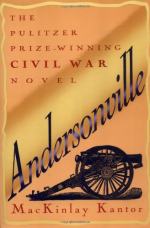“Quite a lot of our, staff officers soon came out, and as near as we could learn the Rebels wanted a truce to bury their dead. Our folks tried to get up an exchange of prisoners that had been taken by both sides the day before, but for some reason they could not bring it about. But the truce for burying the dead was agreed to. Along about dusk some of the boys on my post got to telling about a lot of silver and brass instruments that belonged to one of the bands of the Fourth Division, which had been hung up in some small trees a little way over in front of where we were when the fight was going on the day before, and that when, a bullet would strike one of the horns they could hear it go ‘pin-g’ and in a few minutes ‘pan-g’ would go another bullet through one of them.
“A new picket was just coming’ on, and I had picked up my blanket and haversack, and was about ready to start back to camp, when, thinks I, ‘I’ll just go out there and see about them horns.’ I told the boys what I was going to do. They all seemed to think it was safe enough, so out I started. I had not gone more than a hundred yards, I should think, when here I found the horns all hanging around on the trees just as the boys had described. Some of them had lots of bullet holes in them. But I saw a beautiful, nice looking silver bugle hanging off to one side a little. ‘I Thinks,’ says I, ’I’ll just take that little toot horn in out of the wet, and take it back to camp.’ I was just reaching up after it when I heard some one say,
“‘Halt!’ and I’ll be dog-Boned if there wasn’t two of the meanest looking Rebels, standing not ten feet from me, with their guns cocked and pointed at me, and, of course, I knew I was a goner; they walked me back about one hundred and fifty yards, where their picket line was. From there I was kept going for an hour or two until we got over to a place on the railroad called East Point. There I got in with a big crowd of our prisoners, who were taken the day before, and we have been fooling along in a lot of old cattle cars getting down here ever since.
“So this is ‘Andersonville,’ is it a Well, by —–!”




